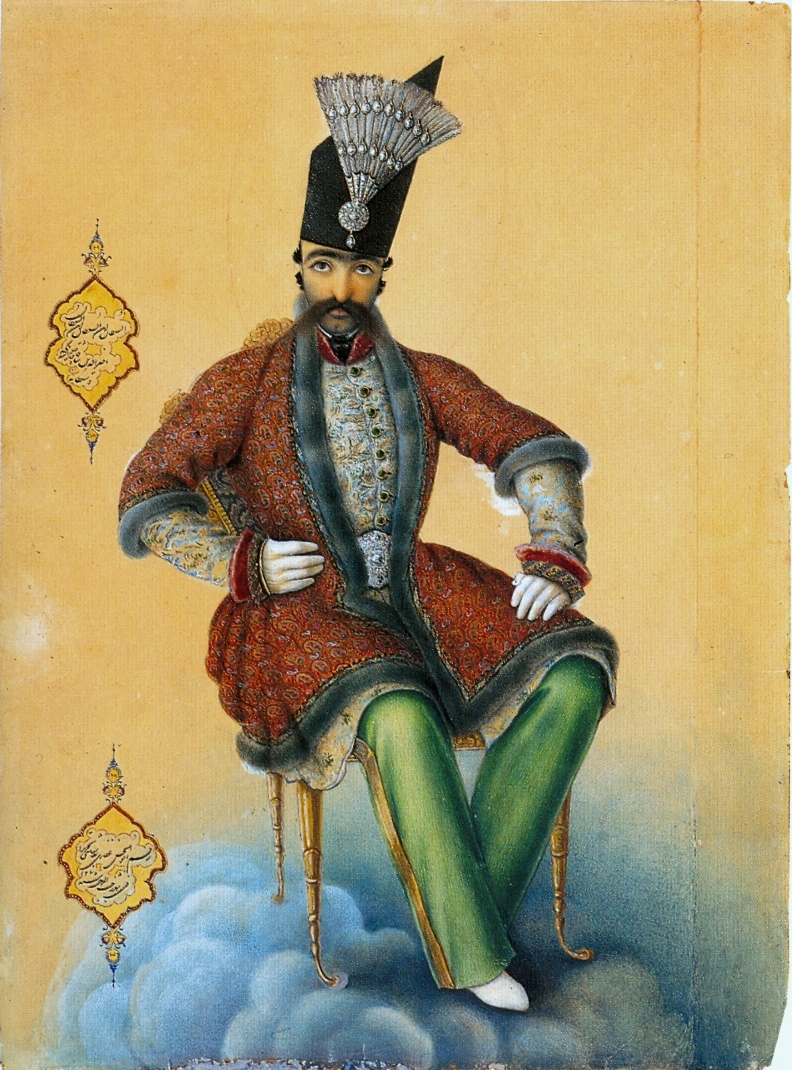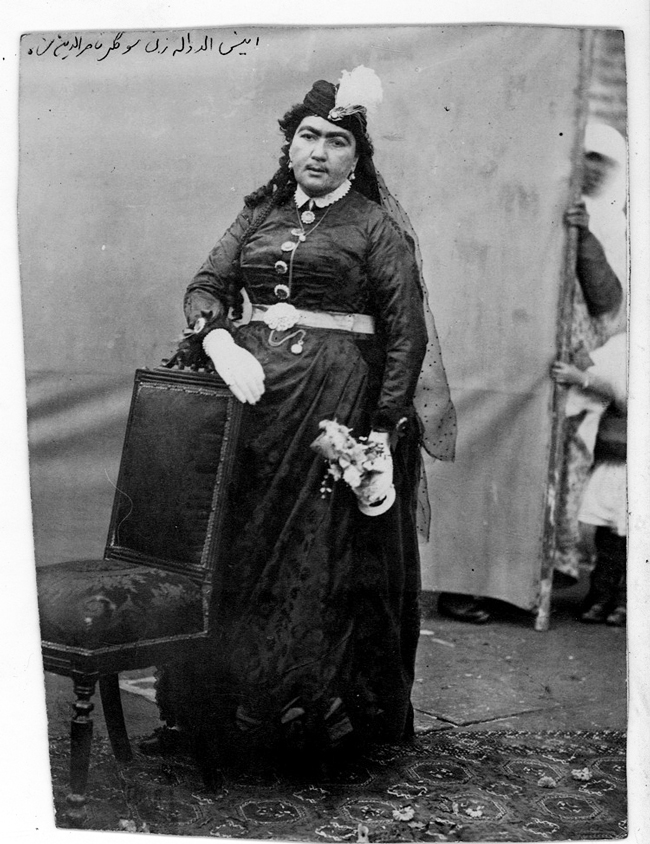|
Amina Aqdas
Amina Aqdas (died 1893) was a royal consort of shah Naser al-Din Shah Qajar of Persia (r. 1848–1896).G. Nashat,Amīna Aqdas" Encyclopædia Iranica, I/9, pp. 954-955, accessed on 30 December 2012. She was the daughter of an impoverished shepherd in a from a village near Garrūs in Kurdistan, and was employed as a free maidservant to the shah's wife Anīs-al-dawla in the Qajar harem in 1859. She eventually became a favorite of the shah, second only to Anīs-al-dawla. Contemporaries attributed her influence to an ability to manipulate of the shah's weak spots: she catered to his whims, encouraged his obsessions, and appealed to his parsimony. Her power was also enhanced by the shah's intense attachment to her nephew, Gholam-Ali, Malijak-e Thani, also known as Aziz Al-Soltan. She supported the career of Mirza Ali Asghar Khan Amin al-Soltan Mirza Ali Asghar Khan ( fa, میرزا علیاصغر خان; 6 January 1858 – 31 August 1907), also known by his honorific titles of ... [...More Info...] [...Related Items...] OR: [Wikipedia] [Google] [Baidu] |
Naser Al-Din Shah Qajar
Naser al-Din Shah Qajar ( fa, ناصرالدینشاه قاجار; 16 July 1831 – 1 May 1896) was the fourth Shah of Qajar Iran from 5 September 1848 to 1 May 1896 when he was assassinated. He was the son of Mohammad Shah Qajar and Malek Jahan Khanom and the third longest reigning monarch in Iranian history after Shapur II of the Sassanid dynasty and Tahmasp I of the Safavid dynasty. Nasser al-Din Shah had sovereign power for close to 51 years. He was the first modern Persian monarch who formally visited Europe and wrote of his travels in his memoirs. A modernist, he allowed the establishment of newspapers in the country and made use of modern forms of technology such as telegraphs, photography and also planned concessions for railways and irrigation works. Despite his modernizing reforms on education, his tax reforms were abused by people in power, and the government was viewed as corrupt and unable to protect commoners from abuse by the upper class which led to increasi ... [...More Info...] [...Related Items...] OR: [Wikipedia] [Google] [Baidu] |
Anīs-al-dawla
file:ملیجک_و_انیسالدوله.jpg, link=https://fa.wikipedia.org/wiki/%D9%BE%D8%B1%D9%88%D9%86%D8%AF%D9%87:%D9%85%D9%84%DB%8C%D8%AC%DA%A9_%D9%88_%D8%A7%D9%86%DB%8C%D8%B3%E2%80%8C%D8%A7%D9%84%D8%AF%D9%88%D9%84%D9%87.jpg, 232x232px, Anis al-Dawla and Aziz al-Soltan Anis al-Dawla (died 1896) was a royal consort of shah Naser al-Din Shah Qajar of Persia (r. 1848–1896).G. Nashat, “ANĪS-AL-DAWLA,” Encyclopædia Iranica, II/1, pp. 74-76, available online at http://www.iranicaonline.org/articles/anis-al-dawla-d (accessed on 30 December 2012). Life She was the daughter of an impoverished shepherd in a from a village in Lavāsān, northeast of Tehran, and was employed as a free maidservant to Jeyran (wife of Naser al-Din Shah) in the Qajar harem in 1859. She became the favorite of the shah after Jeyrān's death in 1860. She was the only wife to take meals with Nāṣer-al-dīn and to join him regularly at bedtime after he received visits from other wives; she was also t ... [...More Info...] [...Related Items...] OR: [Wikipedia] [Google] [Baidu] |
Qajar Harem
The harem of the monarchs of the Qajar dynasty (1785-1925) consisted of several thousand people. The harem had a precise internal administration, based on the women's rank. Hierarchy and organisation Mother of the Shah As was customary in Muslim harems, the highest rank of the harem hierarchy was that of the monarchs' mother, who in Qajar Iran had the title ''Mahd-e ʿOlyā'' (Sublime Cradle). She had many duties and prerogatives, such as safeguarding the harem valuables, particularly the jewels, which she administered with the help of female secretaries. Consorts In contrast to what was common in the Ottoman Empire, where the sultans normally only had slave consorts, the Qajar shah's also had a custom of diplomatic marriages with free Muslim women, daughters of Qajar dignitaries and princes. Another phenomena of the Qajar harem was that the Shah entered two different kinds of marriages with his harem women: '' ṣīḡa'' (temporary wife), which was often done with concubines, a ... [...More Info...] [...Related Items...] OR: [Wikipedia] [Google] [Baidu] |
Mirza Ali Asghar Khan Amin Al-Soltan
Mirza Ali Asghar Khan ( fa, میرزا علیاصغر خان; 6 January 1858 – 31 August 1907), also known by his honorific titles of Amin al-Soltan and Atabak, was the last prime minister of Qajar dynasty, Iran under Naser al-Din Shah Qajar. Early life Ali Asghar was born on 6 January 1858. He was the second son of Agha Ebrahim, an influential court minister of Georgians, Georgian origin. When Ali Asghar was 15 years old, he began helping his father in politics. The next year, Ali Asghar and his father accompanied Naser al-Din Shah to his pilgrimage to the holy Shi'a Islam, Shi'a cities of Najaf, Karbala, Kadhimiya, and Samarra. When Ali Asghar returned to his native Tehran, he was promoted to commander of the royal escort cavalry, and in the following years continued to rise to higher offices, eventually being promoted to the treasurer of the army. After the death of his father in 1883, he received the latter's honorific title "Amin al-Soltan" and became the Justice ... [...More Info...] [...Related Items...] OR: [Wikipedia] [Google] [Baidu] |
Olama
In Islam, the ''ulama'' (; ar, علماء ', singular ', "scholar", literally "the learned ones", also spelled ''ulema''; feminine: ''alimah'' [singular] and ''aalimath'' [plural]) are the guardians, transmitters, and interpreters of religious knowledge in Islam, including Islamic doctrine and law. By longstanding tradition, ulama are educated in religious institutions ''(madrasas)''. The Quran and sunnah (authentic hadith) are the scriptural sources of Sharia, traditional Islamic law. Traditional way of education Students do not associate themselves with a specific educational institution, but rather seek to join renowned teachers. By tradition, a scholar who has completed his studies is approved by his teacher. At the teacher's individual discretion, the student is given the permission for teaching and for the issuing of legal opinions ''(fatwa)''. The official approval is known as the ''Ijazah, ijazat at-tadris wa 'l-ifta'' ("license to teach and issue legal opinion ... [...More Info...] [...Related Items...] OR: [Wikipedia] [Google] [Baidu] |
1893 Deaths
Events January–March * January 2 – Webb C. Ball introduces railroad chronometers, which become the general railroad timepiece standards in North America. * Mark Twain started writing Puddn'head Wilson. * January 6 – The Washington National Cathedral is chartered by Congress; the charter is signed by President Benjamin Harrison. * January 13 ** The Independent Labour Party of the United Kingdom has its first meeting. ** U.S. Marines from the ''USS Boston'' land in Honolulu, Hawaii, to prevent the queen from abrogating the Bayonet Constitution. * January 15 – The ''Telefon Hírmondó'' service starts with around 60 subscribers, in Budapest. * January 17 – Overthrow of the Kingdom of Hawaii: Lorrin A. Thurston and the Citizen's Committee of Public Safety in Hawaii, with the intervention of the United States Marine Corps, overthrow the government of Queen Liliuokalani. * January 21 ** The Cherry Sisters first perform in Marion, Iowa. ** The Ta ... [...More Info...] [...Related Items...] OR: [Wikipedia] [Google] [Baidu] |
Qajar Royal Consorts
Qajar Iran (), also referred to as Qajar Persia, the Qajar Empire, '. Sublime State of Persia, officially the Sublime State of Iran ( fa, دولت علیّه ایران ') and also known then as the Guarded Domains of Iran ( fa, ممالک محروسه ایران '), was an Iranian state ruled by the Qajar dynasty, which was of Turkic origin,Cyrus Ghani. ''Iran and the Rise of the Reza Shah: From Qajar Collapse to Pahlavi Power'', I. B. Tauris, 2000, , p. 1William Bayne Fisher. ''Cambridge History of Iran'', Cambridge University Press, 1993, p. 344, Dr Parviz Kambin, ''A History of the Iranian Plateau: Rise and Fall of an Empire'', Universe, 2011, p.36online edition specifically from the Qajar tribe, from 1789 to 1925.Abbas Amanat, ''The Pivot of the Universe: Nasir Al-Din Shah Qajar and the Iranian Monarchy, 1831–1896'', I. B. Tauris, pp 2–3; "In the 126 years between the fall of the Safavid state in 1722 and the accession of Nasir al-Din Shah, the Qajars evolved from a s ... [...More Info...] [...Related Items...] OR: [Wikipedia] [Google] [Baidu] |




